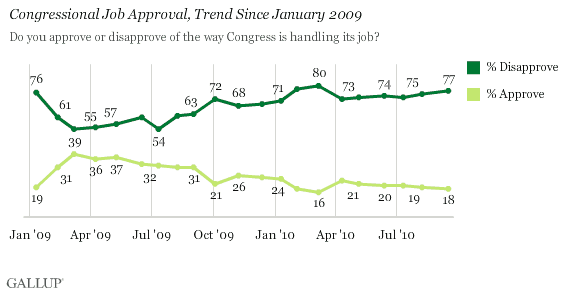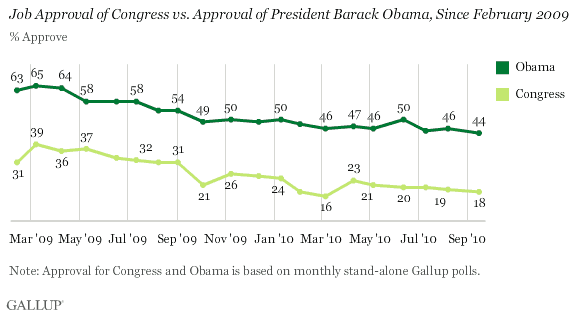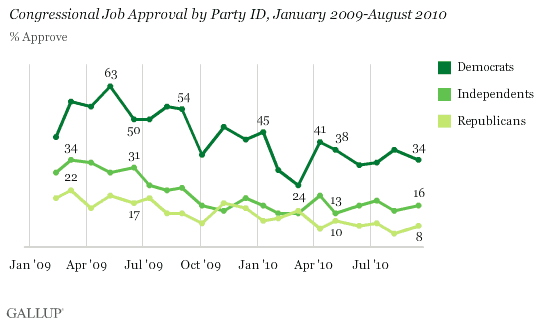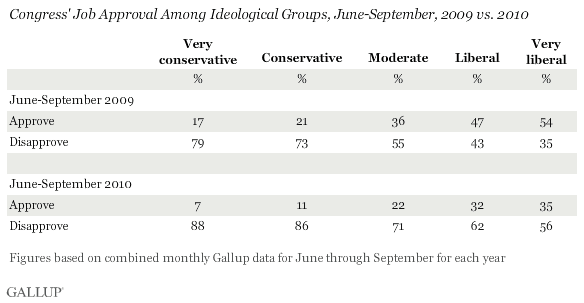PRINCETON, NJ -- Public approval of Congress remains in short supply in September, with 18% of Americans now approving of the job it is doing, similar to the 19% approving in August. Congress' approval rating has not been above 20% since May, and has not surpassed 30% since September 2009.

The latest findings are from a USA Today/Gallup poll conducted Sept. 13-16. The decline in approval of Congress since the beginning of 2009 has closely paralleled the drop in approval for President Barack Obama over the same period. Both the president and the Democratic-led Congress saw a sharp slide in their public approval ratings last summer, punctuated by a sharp drop in October. Their ratings subsequently leveled off, but fell slightly further this summer, and remain at the lower level today.

Congress' current approval rating is now approaching Gallup's record low of 14%, measured in July 2008, and is already worse than the lowest congressional approval score in a midterm election year, 21% in 1994 and 2006.
Congress' approval rating is strikingly low among both Republicans and independents, albeit largely unchanged from ratings of the past four months. While Democrats are more charitable in their reviews of the Democratically controlled Congress, barely a third now approve -- a shift from a year ago at this time, when a majority approved.

Underscoring the difficulty the Democratic Congress is having in satisfying its political base, the majority of political liberals -- those calling themselves "liberal" as well as "very liberal" -- disapprove of the job it is doing. A year ago at this time, the majority of the very liberal group approved, as did close to half of liberals.

Bottom Line
Americans show no signs of relenting in their broad disapproval of the job Congress is doing as the midterm elections draw near, setting the stage for major seat losses for the Democratic majority. It is not only Republicans and independents who are driving this, but rank-and-file Democrats. Members of the 111th Congress can point to several major legislative accomplishments, including passing President Obama's requested economic stimulus plan, healthcare reform, and, most recently, financial regulatory reform -- all of which are widely popular with Democrats (although met with mixed reviews from the public as a whole). Still, even Democrats' support for Congress has been ratcheting down.
Results for this Gallup poll are based on telephone interviews conducted Sept. 13-16, 2010, with a random sample of 1,019 adults, aged 18 and older, living in the continental U.S., selected using random-digit-dial sampling.
For results based on the total sample of national adults, one can say with 95% confidence that the maximum margin of sampling error is ±4 percentage points.
Interviews are conducted with respondents on landline telephones (for respondents with a landline telephone) and cellular phones (for respondents who are cell phone-only). Each sample includes a minimum quota of 150 cell phone-only respondents and 850 landline respondents, with additional minimum quotas among landline respondents for gender within region. Landline respondents are chosen at random within each household on the basis of which member had the most recent birthday.
Samples are weighted by gender, age, race, education, region, and phone lines. Demographic weighting targets are based on the March 2009 Current Population Survey figures for the aged 18 and older non-institutionalized population living in continental U.S. telephone households. All reported margins of sampling error include the computed design effects for weighting and sample design.
In addition to sampling error, question wording and practical difficulties in conducting surveys can introduce error or bias into the findings of public opinion polls.
View methodology, full question results, and trend data.
For more details on Gallup's polling methodology, visit https://www.gallup.com/.
